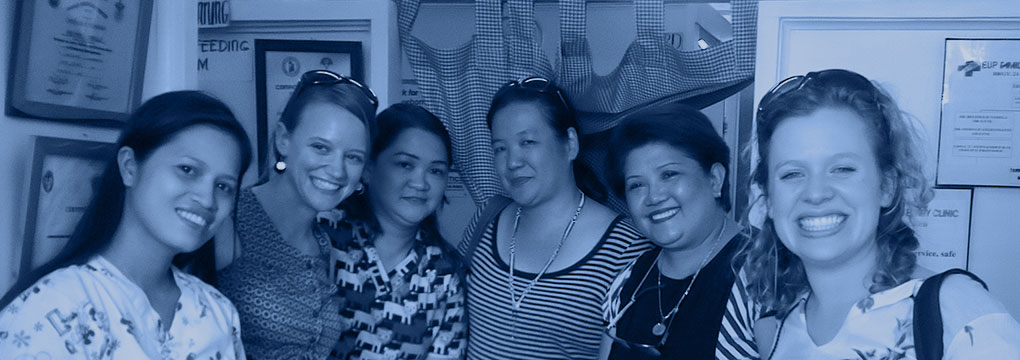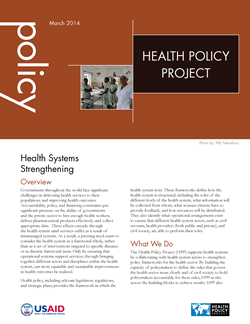The Health Policy Project ended in 2016. Work continued under Health Policy Plus (HP+) until 2022.
Health Systems Strengthening

Health Policy Project
Overview
Governments throughout the world face significant challenges in delivering health services to their populations and improving health outcomes. Accountability, policy, and financing constraints put significant pressure on the ability of governments and the private sector to hire enough health workers, deliver pharmaceutical products effectively, and collect appropriate data. These effects cascade through the health system until services suffer as a result of mismanaged systems. As a result, a pressing need exists to consider the health system as a functional whole, rather than as a set of interventions targeted to specific diseases or as discrete functional areas. Only by ensuring that operational systems support services, through bringing together different actors and disciplines within the health system, can more equitable and sustainable improvements in health outcomes be realized.
Health policy, including relevant legislation, regulations, and strategic plans, provides the framework in which the health system rests. These frameworks define how the health system is structured, including the roles of the different levels of the health system, what information will be collected from whom, what avenues citizens have to provide feedback, and how resources will be distributed. They also identify what operational arrangements exist to ensure that different health system actors, such as civil servants, health providers (both public and private), and civil society, are able to perform their roles.
What We Do
The Health Policy Project (HPP) supports health systems by collaborating with health system actors to strengthen policy frameworks for the health sector. By building the capacity of policymakers to define the rules that govern the health sector more clearly and of civil society to hold policymakers accountable for these rules, HPP works across the building blocks to achieve results. HPP also collaborates with host-country stakeholders to generate and use health system data, including financing and service data, to better understand and address health system needs. Specifically, the project
- Trains women leaders to be health system leaders in both government and advocacy roles
- Works with civil society advocates to hold local government officials accountable for health sector commitments
- Builds local capacity in the development of data and tools for advocacy and policy
- Collaborates with health system stakeholders, including ministries of health, on policy framework development
- Supports health sector decentralization by assisting policymakers to define roles between different levels of government
- Strengthens health sector stewardship of government institutions and agencies by building capacity to address new roles and responsibilities
- Designs and applies tools, approaches, and strategies to accurately determine the cost and impact of health programs
- Helps policymakers and advocates understand and plan for costs associated with health policies and programs
Leadership and Governance
HPP works to strengthen the capacity of national and local governments, civil society groups, the private sector, and other health institutions to strengthen forums for health stakeholder engagement; foster stewardship; track progress of health policy, financing, and related programs; and increase accountability for policy and funding commitments. HPP’s governance initiatives cut across family planning and reproductive health, HIV, and maternal health programs. We develop individual and institutional capacity across multiple sectors to engage stakeholders in health policy development, generate and use evidence more effectively, and create and sustain systems to improve accountability for policy action and, ultimately, improve health outcomes.
Read more about Health Policy Project governance activities
Health Financing
HPP works to strengthen health financing to maximize the efficiency, effectiveness, and equity of health programs. While our main focus areas are HIV, maternal health, and family planning and reproductive health (FP/RH) programs and services, improvements in health financing contribute to strengthening the health system as a whole. Maximizing efficiency and effectiveness (E²) and improving health financing policies and systems are central to this endeavor. Health financing policy determines how health systems generate, allocate, and use resources. “Efficiency” involves cutting costs without reducing the quality or quantity of the program’s outputs, while “effectiveness” refers to achieving greater impact without increasing long-term costs.
Read more about Health Policy Project health financing activities
Health Information Systems
The strategic use of data and information in advocacy and decision making helps strengthen health systems by promoting the efficient, equitable, and effective use of resources. HPP builds local capacity to gather, analyze, and use data to support evidence-based decisionmaking. We support the design, adaptation, and use of innovative models and tools, including the RAPID Model, the Spectrum System of Policy Models, and the GAP Tool. As a result, local stakeholders are able to strategically use data and information from these tools to inform health policy decisions.
News
News: Health Policy Project at the Second Symposium on Health Systems Research
From October 31-November 3, 2012, more than 1,700 participants took part in over 200 events at the Second Symposium on Health Systems Research in Beijing, China. HPP participated in the meeting and made several presentations.
News: National Institutes in India Use Computer Software Models to Evaluate Health and Family Planning Policy Options
HPP conducted training on use of software models for evidence-based decision making and advocacy on family planning policy.
News: Information System Helps Manage Social Services in Guatemala, Gains Government’s Support
Integrated Social Information System helps Guatemalan government agencies improve the management of health and education programs.
Story from the Field: African Women Leaders Add their Voices to Development
Nyokabi Ruth Musila is one of 24 participants in a workshop to strengthen African women leaders' participation in defining country priorities for family planning and reproductive health.
News: Repositioning Family Planning and Reproductive Health in Africa
Parliamentarians reinforce commitment to strengthening health systems in their countries.
Publications and Resources
Linking Health Policies with Health Systems and Health Outcomes: A Conceptual Framework
This conceptual framework, prepared by the Health Policy Project, is designed to show the flow from health-related policy development to health-related policy and program implementation.
The GAP Tool: Gather, Analyze, and Plan
The GAP Tool identifies funding gaps and helps monitor progress in family planning programs.


